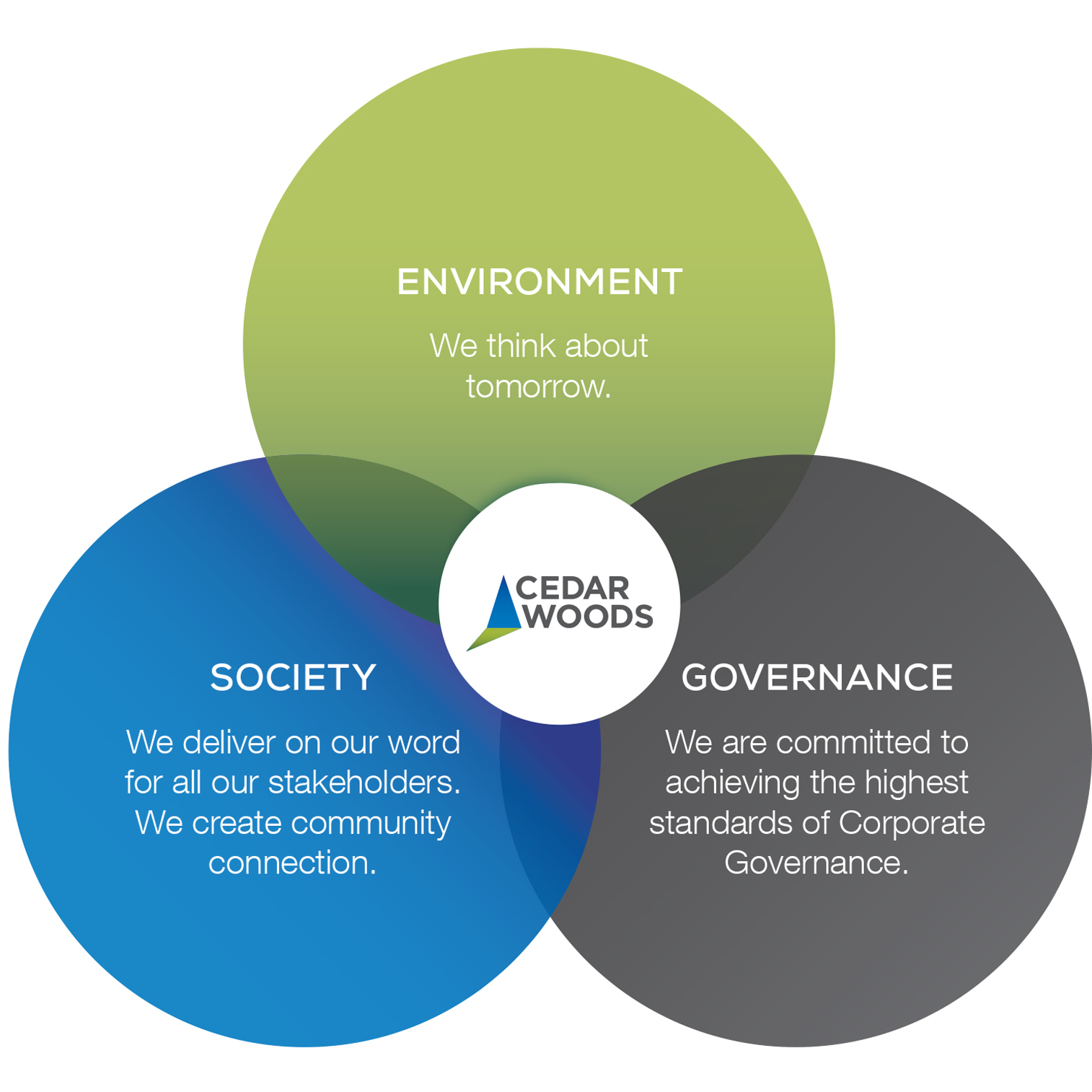Our vision is to be the best Australian property company renowned for performance and quality. We aim to play a positive role in society over the long-term, through our products and services, which are fundamental to human wellbeing in homes and businesses, and through behaving responsibly in our markets and in our communities.
Cedar Woods does more than create vibrant communities. We are proud of our reputation for being environmentally and socially responsible. We continually look for ways to:
- Reduce our ecological footprint
- Promote affordable housing
- Respect indigenous and cultural heritage
- Stimulate economic investment and jobs
- Foster cooperative stakeholder relationships
- Activate the communities we create
- Foster diversity, equal opportunity and career development in the workplace
- Provide a safe work environment for all who work on Cedar Woods projects
- Instill our values and promote an ethical business culture through strong governance
This section communicates our progress and achievements on sustainability, community outcomes and governance, benefiting those affected by our actions.

Protecting the Environment
Environmental issues, including climate change, are a challenge affecting society globally and we must address them collectively to preserve our planet for future generations.
Cedar Woods recognises that its development activities carry the risk of environmental impact. The strategies to limit this impact can be found in the ESG Report and summarised below.
Our Objectives
The company formulated its Environmental Management Policy which incorporates mitigation and adaption measures for climate change throughout the business lifecycle.
- Our focus on urban infill seeks to mitigate climate change by redeveloping existing brownfield sites to avoid further impact on the natural environment, lower travel emissions by reducing travel distances and encouraging the use of public transport.
- When evaluating the business case for new projects we investigate potential climate change impacts, along with the adoption of mitigation strategies. These factors affect urban design, development outcomes and project feasibility.
- During detailed design we plan for climate responsive solutions, such as conservation and protection of natural bushland, rehabilitation of degraded land, design guidelines (with energy and water efficiency measures) and bush fire risk mitigation.
- During construction we implement strategies and initiatives relating to conservation, revegetation, offsets, environmental management, wildlife protection, water management and, in some cases, infrastructure for renewable energy. We also work to reduce and recycle demolition and construction waste.
- Post construction we engage in activities to monitor and manage ongoing environmental impacts such as fauna surveys, ground water monitoring, and conservation reserve management.
/Sustainability_Mobile.jpg?ext=.jpg)
Key Areas
SUSTAINABLE COMMUNITIES
Cedar Woods has a strategic focus on creating sustainable communities, with a growing involvement in transit-oriented-development and urban renewal. This enables us to better respond to climate change by reducing urban sprawl, maximising use of existing infrastructure, including public transport, and by developing more compact cities.
BIODIVERSITY
Land development on greenfield estates can impact local bushland habitat, ecological communities and significant species. We aim to minimise and mitigate these impacts to protect biodiversity in surrounding environments. In most cases, only that part of a project site already degraded or denuded is suitable for urban development and environmental rehabilitation.
WATER
Australia’s climate is characterised by variability, either severe flooding or long-term drought / water scarcity (often resulting in water restrictions). In response, Cedar Woods is constantly considering where its water is sourced, how efficiently it is used and how water quality is managed.
ENERGY
Implementing strategies to reduce energy use from fossil fuels and increase the uptake of renewable energy is an important part of our carbon emissions mitigation strategy. Most energy initiatives are realised at the building stage.
WASTE
Investigating land for potential contamination, identifying hazardous waste and undertaking remediation and removal of waste to enable urban development, are important considerations when considering new acquisitions and project delivery. We manage demolition and construction impacts by containing or removing contaminants and minimising waste to landfill with subsequent environment and financial benefits.
ESG Ratings
Since 2022 Cedar Woods has maintained a rating of A (on a scale of AAA-CCC) in the MSCI ESG Ratings assessment.
Disclaimer statement
The use by cedar woods of any msci esg research llc or its affiliates (“msci”) data, and the use of msci logos, trademarks, service marks or index names herein, do not constitute a sponsorship, endorsement, recommendation, or promotion of cedar woods by msci. Msci services and data are the property of msci or its information providers, and are provided ‘as-is’ and without warranty. Msci names and logos are trademarks or service marks of msci.

/Sustainability_Mobile_QLD.jpg?ext=.jpg)
/Sustainability_Desktop_QLD.jpg?ext=.jpg)